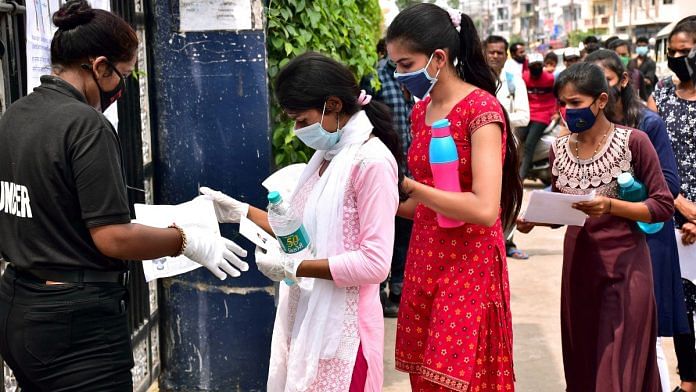New Delhi: The Supreme Court has given its green signal to NEET-UG and NEET-PG counseling for 2021-22 admissions.
On Friday, a two-judge bench led by Justice D.Y. Chandrachud upheld the validity of the Modi government’s July 2021 notification to allow 27 per cent reservation for Other Backward Classes (non-creamy layer) in the all-India quota seats in state-run government medical institutions.
The court also permitted 10 per cent reservation for the Economically Weaker Section (EWS), with a Rs 8 lakh annual income as the threshold, for NEET-PG and NEET-UG admissions this academic year.
However, this is only an interim measure as the bench didn’t rule on the validity of the EWS reservation. The reservation has been allowed this year to ensure that the admission process is not “dislocated”, the court clarified.
For future and prospective admissions, the court will hear the petitions challenging the EWS criteria in the third week of March. Its decision will apply prospectively, thereafter, the bench added.
“Counselling on the basis of NEET-PG 2021 and NEET-UG 2021 shall be conducted by giving effect to reservation as provided by the notice dated 29, July 2021 including the 27 per cent for the OBC category and 10 per cent reservation for EWS in All-India quota seats,” the order said.
“The validity of criteria for identification of EWS prospectively, for the future, will be subject to the final result of the petition. Petition shall be listed for a final hearing in the third week of March, 2022,” the it added.
Since the order pronounced Friday was an interim one, the court did not formulate the reasons for arriving at its decision.
“We will try and formulate the reasons as quickly as possible and upload them,” the bench told the lawyers present.
The order came on a batch of petitions filed by doctors challenging the 29 July 2021 notice issued by the Directorate General of Health Services in the Union Ministry of Health. The notice implements 27 per cent reservation for OBC non-creamy layer and a 10 per cent reservation for EWS in all-India quota seats.
Filed on 24 August 2021, the petition led to a notice on 6 September, while NEET results were issued on 28 September. Arguments were heard in part on 7 October, after which the Centre was granted two weeks to respond.
The hearings that followed witnessed many twists and turns.
Also read: ‘Not your jurisdiction’, SC tells Calcutta HC, orders ex-chief secy to appear for case in Delhi
What happened during the hearings
On 21 October, the Modi government didn’t file an affidavit and took two days to do the same. However, the court on the same day formulated issues asking the Centre to disclose the rationale for adopting the criteria to identify an EWS.
Four days later, the Modi government deferred the NEET counselling of its own accord. Later, it filed an affidavit to justify the criteria fixed and claimed it was done after due deliberations.
When the matter was heard again on 28 October, the Centre sought an adjournment, requesting the court to hear the matter after Diwali. Subsequently, the government told the court it had taken a decision to revisit the criteria and wanted an adjournment, a request acceded by the bench.
A three-member panel headed by former finance secretary Ajay Bhushan Pandey was set up, which in a report submitted on 31 December recommended to retain the Rs 8 lakh criteria for EWS reservation.
After accepting its suggestions, the Centre rushed to the top court, pleading for an urgent hearing of the case. This came after massive protests across India by senior residents against delayed counselling PG medical courses.
In the court, those opposing the reservation asserted before the court that no proper assessment was done to arrive at the figure of Rs 8 lakh annual income as the criterion for determining economic backwardness. They asked the court to fix Rs 2.5 lakh as the limit for this year’s counseling.
According to them, the Rs 8 lakh limit was “allowing the creamy layer to come in”. The EWS criteria of nutrition, landlessness, employment, etc. was completely ignored by the panel, they told the bench.
Also read: Uttarakhand HC asks EC if virtual rallies, online voting viable options for assembly polls
What the court finally said
On Thursday, the Supreme Court questioned the government on the Rs 8 lakh income ceiling fixed to determine EWS.
The court asked the Modi government counsel how the criteria was fixed within two days of the 103rd amendment, which introduced the reservation in 2019, and wondered whether any consultation process was undertaken before the same was notified.
The amendment allowed 27 per cent reservation for OBCs along with 10 per cent quota for those in the EWS category in higher educational institutions.
“The 103rd amendment was notified on 14 January, 2019 and on 17 January this notification (specifying the income-limit) came. So, in two days the consultation with the Ministry of Social Justice took place,” the bench asked solicitor general Tushar Mehta, as it reserved its verdict on the petitions.
On his part, Mehta denied the charges that there was no application of mind and submitted the panel had delved into various aspects before giving its interim report. He sought to assuage the fears of those against quota, adding it would not affect their chances of securing seats as there is a move to increase the number of seats by about 20-25 per cent.
Mehta said the reservation policy was part of the government’s inclusive growth programme and the increased seats will take care of the load on account of EWS quota.
(Edited by Amit Upadhyaya)
Also read: Delhi HC halts Amazon-Future arbitration in Singapore over Reliance deal



